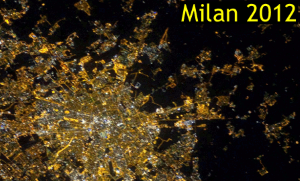Let us know at teamludlow.uk.
The nights are drawing in, as they say. It’s dark in the evening and, if you an early riser like me, in the morning. Overnight it’s close to pitch black as the majority of streetlights are turned off between midnight and five-thirty in the morning.
There are 18,500 street lights in Shropshire, each costing between £40 and £80 a year to operate. Shropshire Council started to introduce part-night lighting in April 2012. It says that it is “turning the lights off principally to reduce harmful carbon dioxide emissions and manage costs.” Around two-thirds of street lights are turned off in Shropshire during the early hours of the morning.
Is this the right policy? People tell me they feel less safe with the lights off overnight – even those that don’t go out at night. Others think the turn off policy is the right one. They want to save energy and enjoy dark skies.
The issue of light pollution is not straightforward. Astronomers and bodies like the Campaign to Protect Rural England campaign for dark skies. I support these campaigns but they are not about creating dark streets but dark skies. If lights are properly designed so that they shed light downwards but not upwards, light pollution will be minimised. Well that is what I thought until I saw some recent stunning images from the International Space Station. These show that introduction of new LED lighting in Milan has actually increased light pollution. Dark skies enthusiasts might need a bit of a rethink after those images.
So what do the scientists say about safety? Does the street light switch off increase accidents and crime? The answer it seems is “No”.
Researchers analysed 14 years of data from 62 local authorities across England and Wales that had reduced lighting. The results (published here) show no association between reduced street lighting and night-time traffic accidents. They also show no link between overall levels of crime and changes in street lighting (see reports in the Guardian and FT). Looking at this study in more detail, there is some suggestion that robbery increases with part-night lighting. Some authorities dim lights rather than turn them off and the data suggest this has reduced violent crime. Using ‘white light’ leads to an overall reduction in crime. White light is emitted by the LED lights that are gradually being introduced across Shropshire to replace the less efficient orange glow sodium lamps. These detailed research results are not conclusive due to limitations in the data.
Overall, the statistics suggest we as safe with dimmed or part-night lights as we are lights than blaze all night.
Our lives are not governed by statistics. Individual experiences can be very different. One Ludlow couple, burgled while they were away for a few days, believe part night lighting make it easier for criminals. Many other people tell me they feel less safe in their homes and on the streets when many of the lights are out.
This is something of a dilemma for councillors. Just about all the data we have suggests that turning off street lights does not expose people to greater risk of injury or crime. But turning lights off makes people more fearful, less confident about going out, walking home or leaving their home unattended. That is a serious issue. It is no part of our role as councillors to create an environment where people feel less safe.
So do you feel less safe with part night lighting? Of maybe it has no impact on you. You can let us know by completing our community survey at teamludlow.uk or commenting below.



does it really matter? surely there are more important things to discuss
No, I welcome the darker nights , not only because of the saving in carbon and expense but the sodium lights are very hard to exclude from the bedroom to ensure good sleep. If people are fearful why don’t they install security lights which are now very cheap and easy to install. Perhaps the council could offer a small subsidy to elderly or disabled people on low incomes.
I like dark skies, and carry a torch if it’s really dark. Ludlow always seems very safe at night.